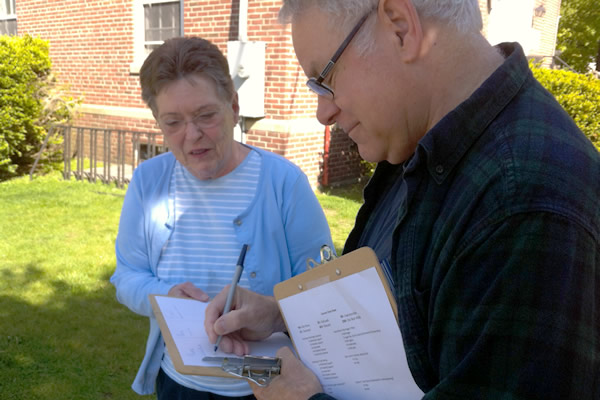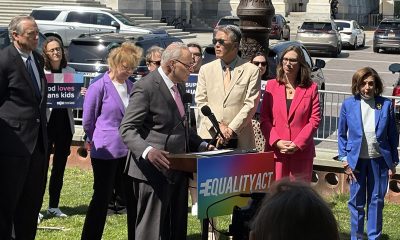National
Maine marriage campaign optimistic going into referendum
Polls indicate majority of voters would support ballot measure to allow same-sex marriage.
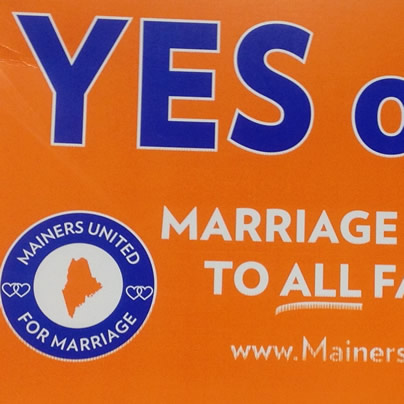
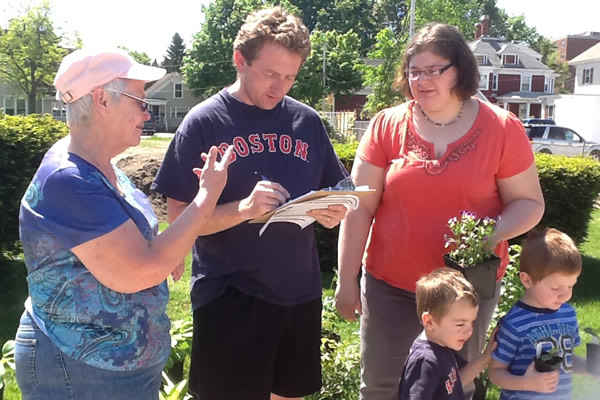
A Mainers United for Marriage volunteer speaks with likely voters in Sanford (Photo courtesy of Mainers United for Marriage)
SCARBOROUGH, Maine – Portland resident Ellen Ward never thought she would find herself speaking with fellow voters in support of marriage rights for same-sex couples.
The self-described introvert changed her mind, however, in 2009 when she listened to gays and lesbians and others testify in support of a same-sex marriage bill during a legislative hearing in Augusta, the state capital.
“They were leading very what most people call normal lives and just wanted to be able to affirm their love and commitment in the same way that other people got too,” Ward told the Washington Blade as she canvassed a suburban Portland neighborhood in the rain on Thursday afternoon. “And I was just really impressed with people standing up and testifying about that and churches testifying about that.”
Nearly three years after Maine voters repealed the state’s same-sex marriage law that then-Gov. John Baldacci signed, supporters of nuptials for gays and lesbians remain confident that a ballot question that would allow them to tie the knot will pass.
“What’s so unique about Maine is because we’re the first state to ever go on the offensive and bring the issue directly to the voters; we’ve been able to dictate our own timeline,” Matt McTighe, campaign manager of Mainers United for Marriage, the group supporting Question 1, told the Blade during an interview at his Portland office on Friday. “There was never a ticking clock. Every time this has come up before when it’s defensive it’s always in the current — something happens, a precipitating action, a court case, a legislative victory whatever. Our opponents then do something to undermine that or write something into the constitution or whatever. And now we’re on their turf. Now we’re playing defense on their side of the field.”
Voters in 2009 repealed the same-sex marriage law by a 53-47 percent margin. McTighe, a former Human Rights Campaign staffer who has worked on marriage efforts in Massachusetts and in other New England states for MassEquality and the Boston-based Gay and Lesbian Advocates and Defenders, described the 2012 campaign in Maine as a “night and day kind of difference” from that run ahead of the 2009 referendum.
“It’s always been designed from the ground up as a campaign for voters,” he said. “We didn’t have to worry about the legislature. We weren’t thinking about a court case or anything like that. Right from the beginning we’ve tried to figure out who are the voters we need to be talking to, let’s employ some of the most sophisticated modeling and tactics that have ever been applied to the marriage movement, let’s bring in the best people, the best consultants, the best field organizers, the best team and put together a plan and a model to figure out who we need to talk to.”
Voter: Same-sex marriage “doesn’t really affect me”
Maine is one of four states with either a same-sex marriage referendum or a constitutional amendment that would define marriage as between a man and a woman on the ballot next month. The Maine Freedom to Marry Coalition in January submitted more than 105,000 signatures to the Secretary of State in order to bring the issue before voters.
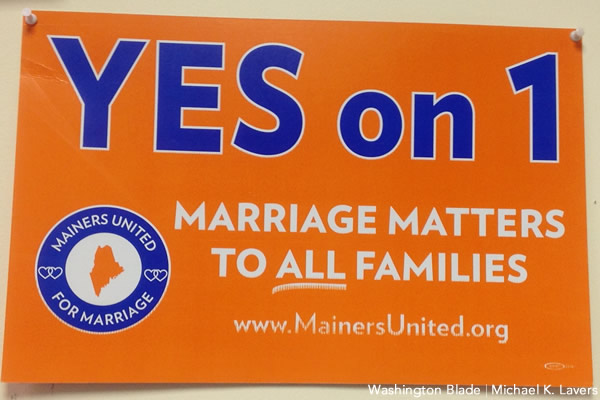
Polls indicate a majority of Maine voters would support a ballot measure to allow same-sex marriage. (Photo by Michael K. Lavers)
A Portland Press Herald poll conducted between Sept. 12-16 shows Question 1 leads by a 57-36 percent margin. A Public Policy Polling survey late last month indicates 52 percent of likely voters support the ballot measure, compared to 44 percent who oppose it and four percent who remain undecided.
Several Scarborough residents with whom Ward spoke said they would support Question 1.
“I’ll probably vote for it,” said one teenager who turns 18 on Nov. 1. He told Ward that he also works with a lesbian. “It doesn’t really affect me. I’m not really 100 percent for it, but I have nothing against it. Not to put it the wrong way but I really don’t care. Do whatever you want. If anything it’ll be better for the economy.”
A woman who lives on a nearby cul-de-sac told Ward that she plans to vote against the ballot question.
“I personally don’t have a problem with you getting together, but I’m not in favor of calling it marriage,” she said. “It’s a sacrament. To redefine marriage, I would vote no.”
Ward conceded the woman’s position against marriage rights for same-sex couples was “discouraging.” She did acknowledge, however, that she feels that her support of basic rights for gays and lesbians was encouraging.
“People have come a long way on that issue, certainly than even 20 years ago,” said Ward, who recalled a telephone conversation she had a couple of months ago with a 90-year-old woman who marched against racial segregation in the 1960s. She initially said she opposed nuptials for gays and lesbians, but Ward said she suddenly changed her mind when she realized the parallels between the civil rights and same-sex marriage movements. “I just feel there are so many people that we talk to these days who are completely supportive.”
Marriage remains “personal” for voters
Six Mainers United for Marriage ads continue to air on local television stations. These include one that features four generations of a family from the Downeast town of Machias and another that spotlights firefighters who support nuptials for gays and lesbians. Protect Marriage Maine, the group opposing Question 1, debuted their first two television ads on Monday.
“You have to make this about the voter themselves. You need to give them a personal reason to connect with the gay people that they know in their lives, to think about this issue in a way that they haven’t thought of before,” said McTighe, who is also a firefighter in the southern coastal Maine town of York. He applauded President Obama for supporting marriage rights for same-sex couples, but stressed the issue remains what he described as a deeply personal one for each potential voter. “You don’t just change your mind because somebody else did. You have to change your mind because somebody made it personal to you. Somebody showed you what is at stake. And also gave you an opportunity to have your questions and concerns addressed. That’s why the grassroots approach has been so unique, to be able to go out and have door-to-door with everyone in our persuadable universe, those people we identified early on.”
Mainers United for Marriage reported to the state Commission on Ethics and Election Practices late on Friday that it has raised slightly more than $3.35 million so far this year, compared with the $429,794.32 that Protect Marriage Maine has pulled in. McTighe told the Blade that he would like to raise another $750,000 to $1 million “to keep pace with” the amount of airtime that the National Organization for Marriage has reserved on the state’s television stations in the weeks leading up to Election Day.
“Now is sort of the crunch time,” he said. “We’ve been prepping for his. We’ve been planning for this so now we feel like we’re prepared for everything. When they come out with one attack, we’ve got plan A. When they come out with a different attack, we’ve got plan B. We can pull it as needed. We can execute as we need to, as long as we have the resources.”
McTighe said another challenge that the campaign faces of potential complacency.
“Because we are doing really well in the polls and because people are seeing all this great stuff and people love our TV ads and all this other stuff and we’re getting all this great earned media, it’s almost too easy for people to say, well they don’t need my help. They don’t me to volunteer. They don’t need me to donate. They don’t need me to write a check. They’ve got 57 percent in the polls. Well I don’t care as much now,” he said. “But the fact is we’ve never won before. Whether that 57 percent is solid or soft or who knows, we’ll see, but we’ve never won. Until we win, we should just assume that our opponents will dump whatever resources they need. We should just assume that they will stop at nothing. And we should assume that no lead is safe until we can actually win and hold one for just once, at least once. Then we can start saying okay well is a point where you’re safe. We’re just not there yet. We’re not there in any of the states.”
In spite of these potential hurdles, McTighe remains optimistic that Mainers United for Marriage will be able to successfully respond to Question 1 opponents’ ads and statements against nuptials for gays and lesbians during the final weeks of the campaign.
“We feel extremely well positioned to deal with anything they throw our way because we’ve had two and a half years to prepare for everything,” he said. “That is what’s so unique about Maine.”
Ward agreed.
“People have had a lot more chance to think about this,” she said, noting the passage of same-sex marriage laws in New York and other states since the 2009 vote. “It’s very much on people’s minds and people are talking about it now. It’s not so unheard of. I think people are just kind of more getting used to the idea and saying, oh, I have people in my family that this [impacts] or I have neighbors and I think they’re very nice people and wow, you know they want to get married. A lot of people had never thought of that before. I think part of it is people are getting used to the idea. And people who are already on board are saying of course, of course this matters. And more and more they want to see this happen. It just seems a no brainer to them.”
Federal Government
RFK Jr.’s HHS report pushes therapy, not medical interventions, for trans youth
‘Discredited junk science’ — GLAAD

A 409-page report released Thursday by the U.S. Department of Health and Human Services challenges the ethics of medical interventions for youth experiencing gender dysphoria, the treatments that are often collectively called gender-affirming care, instead advocating for psychotherapy alone.
The document comes in response to President Donald Trump’s executive order barring the federal government from supporting gender transitions for anyone younger than 19.
“Our duty is to protect our nation’s children — not expose them to unproven and irreversible medical interventions,” National Institutes of Health Director Dr. Jay Bhattacharya said in a statement. “We must follow the gold standard of science, not activist agendas.”
While the report does not constitute clinical guidance, its findings nevertheless conflict with not just the recommendations of LGBTQ advocacy groups but also those issued by organizations with relevant expertise in science and medicine.
The American Medical Association, for instance, notes that “empirical evidence has demonstrated that trans and non-binary gender identities are normal variations of human identity and expression.”
Gender-affirming care for transgender youth under standards widely used in the U.S. includes supportive talk therapy along with — in some but not all cases — puberty blockers or hormone treatment.
“The suggestion that someone’s authentic self and who they are can be ‘changed’ is discredited junk science,” GLAAD President and CEO Sarah Kate Ellis said in a statement. “This so-called guidance is grossly misleading and in direct contrast to the recommendation of every leading health authority in the world. This report amounts to nothing more than forcing the same discredited idea of conversion therapy that ripped families apart and harmed gay, lesbian, and bisexual young people for decades.”
GLAAD further notes that the “government has not released the names of those involved in consulting or authoring this report.”
Janelle Perez, executive director of LPAC, said, “For decades, every major medical association–including the American Medical Association and the American Academy of Pediatrics–have affirmed that medical care is the only safe and effective treatment for transgender youth experiencing gender dysphoria.
“This report is simply promoting conversion therapy by a different name – and the American people know better. We know that conversion therapy isn’t actually therapy – it isolates and harms kids, scapegoats parents, and divides families through blame and rejection. These tactics have been used against gay kids for decades, and now the same people want to use them against transgender youth and their families.
“The end result here will be a devastating denial of essential health care for transgender youth, replaced by a dangerous practice that every major U.S. medical and mental health association agree promotes anxiety, depression, and increased risk of suicidal thoughts and attempts.
“Like being gay or lesbian, being transgender is not a choice, and no amount of pressure can force someone to change who they are. We also know that 98% of people who receive transition-related health care continue to receive that health care throughout their lifetime. Trans health care is health care.”
“Today’s report seeks to erase decades of research and learning, replacing it with propaganda. The claims in today’s report would rip health care away from kids and take decision-making out of the hands of parents,” said Shannon Minter, legal director of NCLR. “It promotes the same kind of conversion therapy long used to shame LGBTQ+ people into hating themselves for being unable to change something they can’t change.”
“Like being gay or lesbian, being transgender is not a choice—it’s rooted in biology and genetics,” Minter said. “No amount or talk or pressure will change that.”
Human Rights Campaign Chief of Staff Jay Brown released a statement: “Trans people are who we are. We’re born this way. And we deserve to live our best lives and have a fair shot and equal opportunity at living a good life.
“This report misrepresents the science that has led all mainstream American medical and mental health professionals to declare healthcare for transgender youth to be best practice and instead follows a script predetermined not by experts but by Sec. Kennedy and anti-equality politicians.”
The White House
Trump nominates Mike Waltz to become next UN ambassador
Former Fla. congressman had been national security advisor

President Donald Trump on Thursday announced he will nominate Mike Waltz to become the next U.S. ambassador to the U.N.
Waltz, a former Florida congressman, had been the national security advisor.
Trump announced the nomination amid reports that Waltz and his deputy, Alex Wong, were going to leave the administration after Waltz in March added a journalist to a Signal chat in which he, Defense Secretary Pete Hegseth, and other officials discussed plans to attack Houthi rebels in Yemen.
“I am pleased to announce that I will be nominating Mike Waltz to be the next United States ambassador to the United Nations,” said Trump in a Truth Social post that announced Waltz’s nomination. “From his time in uniform on the battlefield, in Congress and, as my National Security Advisor, Mike Waltz has worked hard to put our nation’s Interests first. I know he will do the same in his new role.”
Trump said Secretary of State Marco Rubio will serve as interim national security advisor, “while continuing his strong leadership at the State Department.”
“Together, we will continue to fight tirelessly to make America, and the world, safe again,” said Trump.
Trump shortly after his election nominated U.S. Rep. Elise Stefanik (R-N.Y.) to become the next U.S. ambassador to the U.N. Trump in March withdrew her nomination in order to ensure Republicans maintained their narrow majority in the U.S. House of Representatives.
U.S. Federal Courts
Second federal lawsuit filed against White House passport policy
Two of seven plaintiffs live in Md.
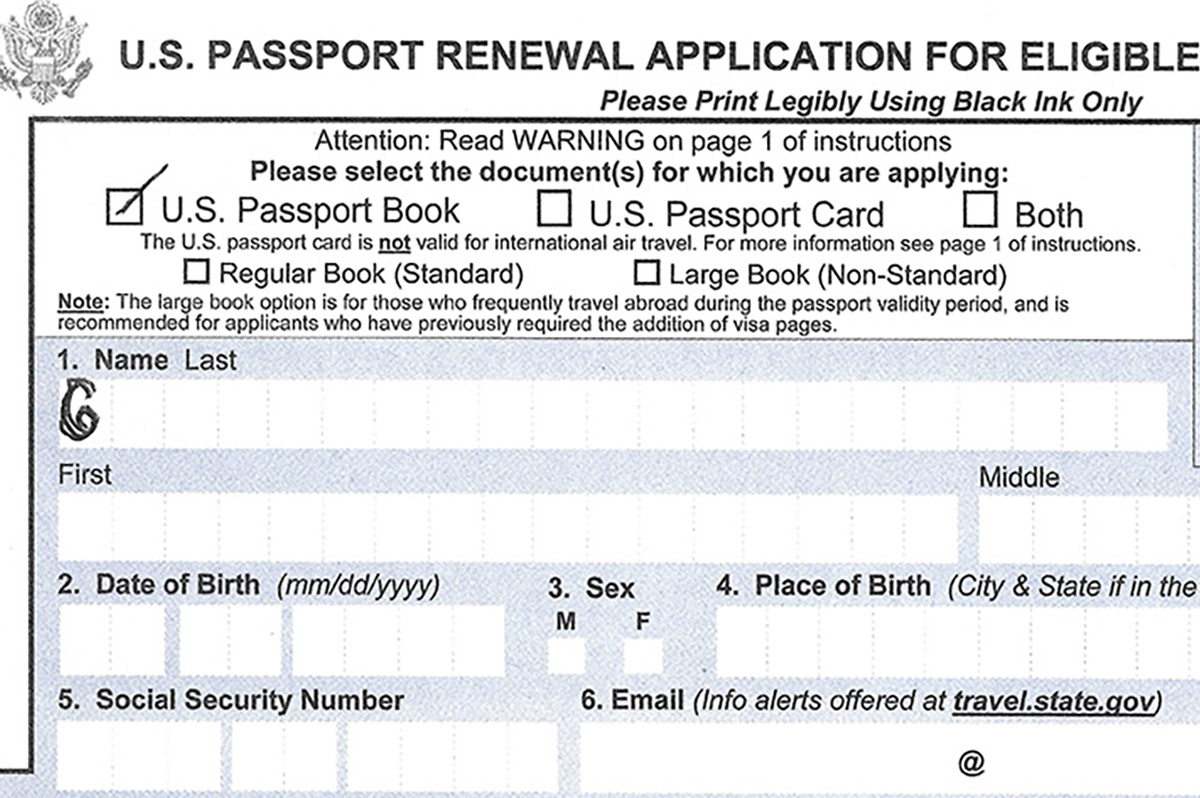
Lambda Legal on April 25 filed a federal lawsuit on behalf of seven transgender and nonbinary people who are challenging the Trump-Vance administration’s passport policy.
The lawsuit, which Lambda Legal filed in U.S. District Court for the District of Maryland in Baltimore, alleges the policy that bans the State Department from issuing passports with “X” gender markers “has caused and is causing grave and immediate harm to transgender people like plaintiffs, in violation of their constitutional rights to equal protection.”
Two of the seven plaintiffs — Jill Tran and Peter Poe — live in Maryland. The State Department, Secretary of State Marco Rubio, and the federal government are defendants.
“The discriminatory passport policy exposes transgender U.S. citizens to harassment, abuse, and discrimination, in some cases endangering them abroad or preventing them from traveling, by forcing them to use identification documents that share private information against their wishes,” said Lambda Legal in a press release.
Zander Schlacter, a New York-based textile artist and designer, is the lead plaintiff.
The lawsuit notes he legally changed his name and gender in New York.
Schlacter less than a week before President Donald Trump’s inauguration “sent an expedited application to update his legal name on his passport, using form DS-5504.”
Trump once he took office signed an executive order that banned the State Department from issuing passports with “X” gender markers. The lawsuit notes Schlacter received his new passport in February.
“The passport has his correct legal name, but now has an incorrect sex marker of ‘F’ or ‘female,'” notes the lawsuit. “Mr. Schlacter also received a letter from the State Department notifying him that ‘the date of birth, place of birth, name, or sex was corrected on your passport application,’ with ‘sex’ circled in red. The stated reason was ‘to correct your information to show your biological sex at birth.'”
“I, like many transgender people, experience fear of harassment or violence when moving through public spaces, especially where a photo ID is required,” said Schlacter in the press release that announced the lawsuit. “My safety is further at risk because of my inaccurate passport. I am unwilling to subject myself and my family to the threat of harassment and discrimination at the hands of border officials or anyone who views my passport.”
Former Secretary of State Antony Blinken in June 2021 announced the State Department would begin to issue gender-neutral passports and documents for American citizens who were born overseas.
Dana Zzyym, an intersex U.S. Navy veteran who identifies as nonbinary, in 2015 filed a federal lawsuit against the State Department after it denied their application for a passport with an “X” gender marker. Zzyym in October 2021 received the first gender-neutral American passport.
Lambda Legal represented Zzyym.
The State Department policy took effect on April 11, 2022.
Trump signed his executive order shortly after he took office in January. Germany, Denmark, Finland, and the Netherlands are among the countries that have issued travel advisories for trans and nonbinary people who plan to visit the U.S.
A federal judge in Boston earlier this month issued a preliminary injunction against the executive order. The American Civil Liberties Union filed the lawsuit on behalf of seven trans and nonbinary people.
-
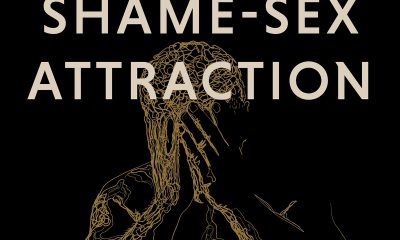
 Books4 days ago
Books4 days agoChronicling disastrous effects of ‘conversion therapy’
-
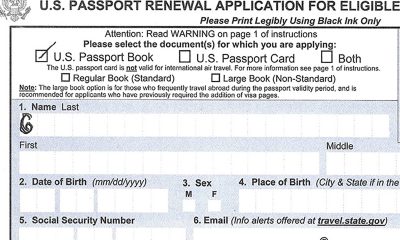
 U.S. Federal Courts3 days ago
U.S. Federal Courts3 days agoSecond federal lawsuit filed against White House passport policy
-
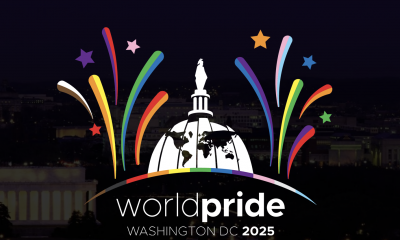
 Opinions3 days ago
Opinions3 days agoWe must show up to WorldPride 2025 in D.C.
-
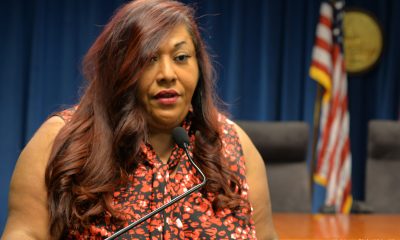
 District of Columbia3 days ago
District of Columbia3 days agoRuby Corado sentencing postponed for third time

